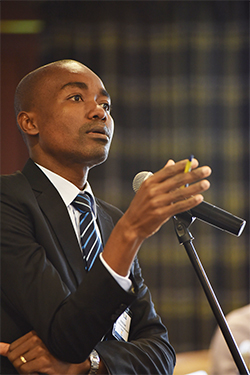EMERGE – Emergency Medicine Education and Research by Global Experts – is a Michigan Medicine-led effort to create a global research network for emergency medicine that includes both high- and low-resource countries. A May11-13 conference in Ann Arbor brought representatives from participating institutions on every continent.

“We’re still a fledgling network, having started last year with 10 sites across four continents. But even in the last month we’ve grown to potentially to six continents,” said Professor of Emergency Medicine and Pediatrics Prashant Mahajan, MD, who organized EMERGE. “There is a great deal of interest in what we are doing. That enthusiasm was evident in our meeting, which was the first opportunity for us to gather in person, get to know one another, and begin shaping our collective vision for how this collaboration will work.”
The three-day meeting included presentations by representatives of the members institutions, a tour of the Michigan Medicine Emergency Department, and a keynote presentation by Dr. Teri Reynolds, who leads the trauma and emergency medicine-focused programs at the World Health Organization. Attendees included emergency medicine physicians from Austria, Australia, Ghana, Brazil, China, Taiwan, India, and more.
“Emergency medicine is a relatively young discipline in Finland and, being a small country, even our opportunities for national studies are limited; studies need a lot of patients,” said Maaret Castren, a Professor of Surgery at the University of Helsinki. “This network can help with large-scale studies because, even though we all have different systems, the medical problems and issues we face are largely the same.”

The School of Public Health’s Statistical Analysis of Biomedical and Educational Research (SABER) data coordinating center has already set up a database to help the participating institutions de-identify and share data across the network, and most sites have already obtained the regulatory approvals needed to do so.
Among the first projects planned is an observational study to assess and compare all of the cases seen across participating sites during the same 24-hour period. What illness or trauma occasioned each visit? What time of day did the patients arrive? What was the course of treatment? Etc. Such a study will not only help the respective sites identify specific commonalities and areas for future research, but will also test the functionality of the information-sharing database, which must accommodate multiple languages, coordinate the unique taxonomies and terminologies used at each site, and so on.
“No one has tried anything like this before, especially including sites from high-, middle-, and low-resources areas so that the network is truly global,” Mahajan said. “Our initial focus will be on meaningful observational studies which can hopefully attract some funding to delve into more complex research, such as large randomized control trials across multiple sites.”
Among the latest institutions to join EMERGE is Muhimbili University of Health and Allied Sciences, in Tanzania, represented at the conference by Emergency Medicine Chief Dr. Hendry Sawe.
“My biggest interest in EMERGE is in sharing data across multiple sites to boost research output, and the systems seem to be in place for that,” Sawe said. “This meeting surpassed my expectations. As a group, we moved quickly beyond getting to know each other to setting up parameters and governance structures, and outlining initial projects. The discussion is beyond what I expected.”
